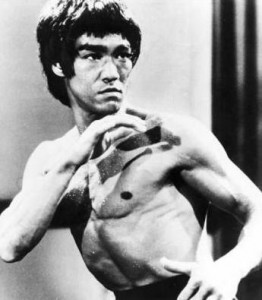 When I was younger, I must admit I knew very little about Bruce Lee. Karate and Kung Fu were the martial arts that I dreamed about, not Jeet Kune Do (“The Way of The Intercepting Fist”). I watched Jackie Chan movies long before had ever seen Enter the Dragon or The Big Boss. Back then, I probably saw more Brandon Lee movies than those starring his father. But in 1993, I saw a movie called Dragon: the Bruce Lee Story. The movie dramatized much of Lee’s life, but the film really sparked my interest in him. The more I discovered about Bruce Lee, to more intrigued I was about him and his ideas. Though Bruce Lee is typically known for his physical feats, he possessed a great wisdom that I would never accurately convey with a simple blog entry (maybe not even in a series of blogs). But I can give you a few of his ideas which have made the strongest impacts on me.
When I was younger, I must admit I knew very little about Bruce Lee. Karate and Kung Fu were the martial arts that I dreamed about, not Jeet Kune Do (“The Way of The Intercepting Fist”). I watched Jackie Chan movies long before had ever seen Enter the Dragon or The Big Boss. Back then, I probably saw more Brandon Lee movies than those starring his father. But in 1993, I saw a movie called Dragon: the Bruce Lee Story. The movie dramatized much of Lee’s life, but the film really sparked my interest in him. The more I discovered about Bruce Lee, to more intrigued I was about him and his ideas. Though Bruce Lee is typically known for his physical feats, he possessed a great wisdom that I would never accurately convey with a simple blog entry (maybe not even in a series of blogs). But I can give you a few of his ideas which have made the strongest impacts on me.
“A wise man can learn more from a foolish question than a fool can learn from a wise answer.” This quote is like most of the quotes you see on Quote of the Day websites, where you take the first part of the sentence, reverse it, and use the reverse at the end of the sentence. Like those quotes, this simple structure packs a lot of meaning in a memorable quotation. On the surface, you can say it is important to ask questions, no matter how foolish it sounds. Mr. Lee says that even wise men can learn from these silly questions. Beyond that though, I think Mr. Lee is also saying that you must be wise to truly interrupt and learn from those answers—hence the remainder of the quote, which hints that a fool cannot make good use of even a wise answer. If you are at work or in class, don’t be afraid to ask questions. But when you get the answer, really stop and think about what it truly means. Don’t fool yourself into thinking you are wise.
“I fear not the man who has practiced 10,000 kicks once, but I fear the man who has practiced one kick 10,000 times.” This is another one of those palindrome-like quotes that I mentioned previously. And like with the previous quotation, you can get many meanings from this one quote. For example, you can say that it is important to respect specialists in a particular field, whether it is in the field of martial arts or in the field of accounting or report writing. We expect specialists to be better than someone with just general skills or knowledge on that topic. And you might be able to get by with someone that can Google the solution, but it might save time and resources if you bring someone who has done the task a few times before and knows the pitfalls of doing something a certain way. That said, you could also say that the quotation is simply warning about diversifying too much. Not only that, but the quote can also mean that in order to be good at something, you must practice at the one thing many, many times, or that to stay good at something, you must keep doing it.
Personally, I think Bruce Lee was commenting on human character, which is a topic he explored quite often in other works. When I was in high school, I tried out for same sports almost every year. I never made Varsity, and yet I eventually earned a letter for my letter jacket. I was very proud of my accomplishment, because I feel I earned the letter based on my character not my meager talent. I kept joining the team each year, even though others outshined me with their skill and physical aptitude—the same people that made Varsity in every sport they tried. I realize that this interpretation is somewhat biased to make me look better, but this interpretation does somewhat tie into the next quote I will discuss.
“A goal is not always meant to be reached; it often serves simply as something to aim at.” They say that practice makes perfect. But that is not entirely true. Sometimes you can try at something and never get good at it (my high school sporting career, for example). But according to Mr. Lee, sometimes accomplishing the goal isn’t the point. It’s the struggle and the journey that matters. So if you are a manager of a company, try setting goals for you and your staff. Make the ultimate goal hard (if not impossible) to obtain, so that you don’t cheating yourself out of seeing what you and they are capable of doing. My recommendation is to also set milestones within your goals. Not only can you track your progress better, but you can still stay motivated as you see that you are indeed making progress.
This quotation may also hint at the value of setting mission statements. Individuals and businesses should all have mission statements, something that will help guild you when making other decisions throughout the year, decade, or lifetime, etc. This will help aim you in the direction you want to move in. Otherwise, you run the chance of wasting the opportunities that present themselves to you. This is a theme in some of Mr. Lee’s other writings. He often talked about not wasting opportunities and time. The following quote for example.
“If you love life, don’t waste time, for time is what life is made up of.” I believe that Mr. Lee wanted everyone to have a passion for life. He didn’t want anyone to just stand still and let things happen. He wanted people to stop procrastinating, take action, and make opportunities happen for themselves. According to his official website, “he was often seen reading a book, doing forearm curls, and watching a boxing film at the same time.” The website also says that his family nicknamed him “Mo Si Ting” which means “never sits still”. We should learn from this example. We can carry a book with us, so that we can continue our reading and self-education while waiting in long lines. Better still, we can use the line as an opportunity to expand our network of contacts. Look at any areas of unproductive time in your life and see that you can do to make it productive.
Bruce Lee certainly lived a productive life. He starred in many movies (20 even before he was 18) and had created his own martial arts form, which still lives on today. He has published several books, and has had many more books about him published. Even though Bruce Lee passed away at the age of 32, his legacy and his teachings continue even today. He once said that, “The key to immortality is first living a life worth remembering.” Ironically, he and his son will forever be known for having their lives cut short. But I doubt, Bruce Lee would have mattered too much about his own death, because I think he would have felt that he had accomplished what he wanted to too up to that point. There is a quote at the end of Dragon: the Bruce Lee Story which I’d like to wrap this blog up with, because it ties so well with the previous one. “There are many people that want to know the way he died; I want to remember the way he lived.”
Photo: Google Images http://me.lt/7ZMQt

